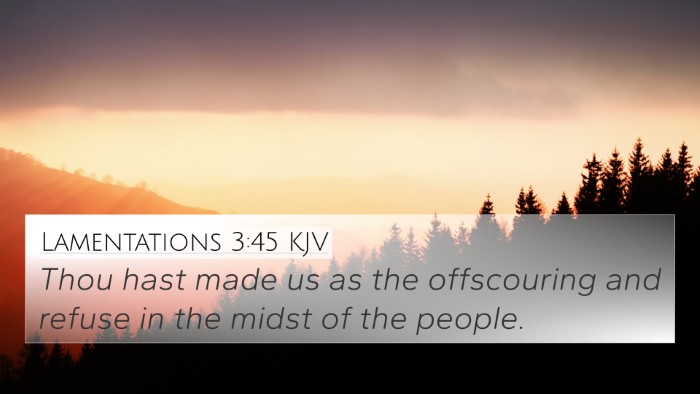Understanding 1 Corinthians 4:13
Verse Reference: 1 Corinthians 4:13
"Being defamed, we intreat: we are made as the filth of the world, and are the offscouring of all things unto this day."
Summary of Insights from Commentaries
This verse reflects the challenging position of the Apostle Paul and his fellow workers in the ministry. They faced criticism, defamation, and were viewed as insignificant by the world. The combined insights from notable public domain commentaries illuminate the profound themes in this verse.
Matthew Henry's Commentary
Matthew Henry explains that the defamation Paul refers to is indicative of the trials faced by Christian ministers. They often endure slander and are called names that do not reflect their true character. He emphasizes that their humble state is a sign of true apostolic mission as their value is derived from their service to Christ, not the accolades of men. Paul exemplifies patience and seeks reconciliation in spite of the injustices he faces.
Albert Barnes' Notes
Albert Barnes adds that being regarded as "filth" indicates the low esteem in which the world held them. This verse highlights the stark contrast between worldly recognition and spiritual worth. He stresses that, despite being treated poorly, the role of these apostles is vital to the establishment of the Gospel. He suggests that facing such scorn serves as a mark of authenticity in their calling and encourages believers to embrace similar humility when facing opposition.
Adam Clarke's Commentary
Adam Clarke presents this verse in the context of a broader message about the trials of faith and commitment to God. He suggests that the 'offscouring' Paul mentions is a metaphorical expression of how ministers are sometimes treated as the dregs of society. Clarke posits that such a position should not lead to despair but rather to a greater reliance on God’s strength, knowing that such trials prove the genuineness of their faith and calling.
Thematic Connections and Cross-References
1 Corinthians 4:13 can be connected to various Biblical verses that elaborate on similar themes of suffering, humility, and the perception of God’s servants. Below are some relevant cross-references:
- Matthew 5:11-12 - "Blessed are you when others revile you and persecute you..." (Similar theme of facing persecution for righteousness)
- 2 Corinthians 6:4-10 - Paul outlines the sufferings experienced by servants of God, reflecting a similar reverence for hardships.
- Philippians 1:28 - Paul reassures believers that their struggles in faith serve as evidence against their adversaries.
- 1 Peter 2:12 - Encouragement to maintain good conduct among the Gentiles despite accusations or slanders.
- Romans 8:36 - "For thy sake we are killed all the day long; we are accounted as sheep for the slaughter." (Reinforces the idea of being undervalued in the world's eyes)
- 1 Thessalonians 1:6 - Discusses the joy of the believers amidst trials, paralleling the experience of Paul and Timothy.
- Hebrews 11:36-38 - Describes the suffering and scorn faced by prophets and God’s servants throughout history.
Deepening Understanding through Cross-References
The beauty of the Scriptures often lies in their interconnectedness. By exploring cross-references, one can deepen their understanding of 1 Corinthians 4:13 and its implications. Here are some perspectives on how to draw connections between scriptures:
Bible verse parallels
By comparing the hardships faced by Paul to those of other biblical figures such as Job or Jeremiah, readers can grasp the consistency of suffering among God’s chosen. This thematic connection serves as an encouragement to maintain faith despite societal rejection.
Tools for Bible cross-referencing
Utilizing Bible concordances or cross-reference guides can provide insights into how different passages unify under the same spiritual themes. Such tools can aid in sermon preparation for ministers and personal study for individual believers seeking a deeper connection with scripture.
Identifying connections between Old and New Testament
The interplay between themes in the Old Testament and the New Testament, such as suffering, humility, and divine purpose, can be significant in understanding 1 Corinthians 4:13. For instance, the sufferings of the Israelites in Egypt (Exodus) can parallel the sufferings of the Apostle Paul as he journeys to spread the Gospel.
Inter-Biblical dialogue
The verses mentioned, among others, create a dialogue that enriches the reading of 1 Corinthians 4:13, highlighting how God's faithfulness manifests in the lives of those who endure hardship for His sake.
Conclusion
In sum, 1 Corinthians 4:13 serves as a powerful reminder of the cost of discipleship and the honor in humility and service. By engaging with the commentaries and related scriptures, one can gain deeper insights into the nature of Christian suffering and the calling to live out one's faith bravely amidst life's trials.




